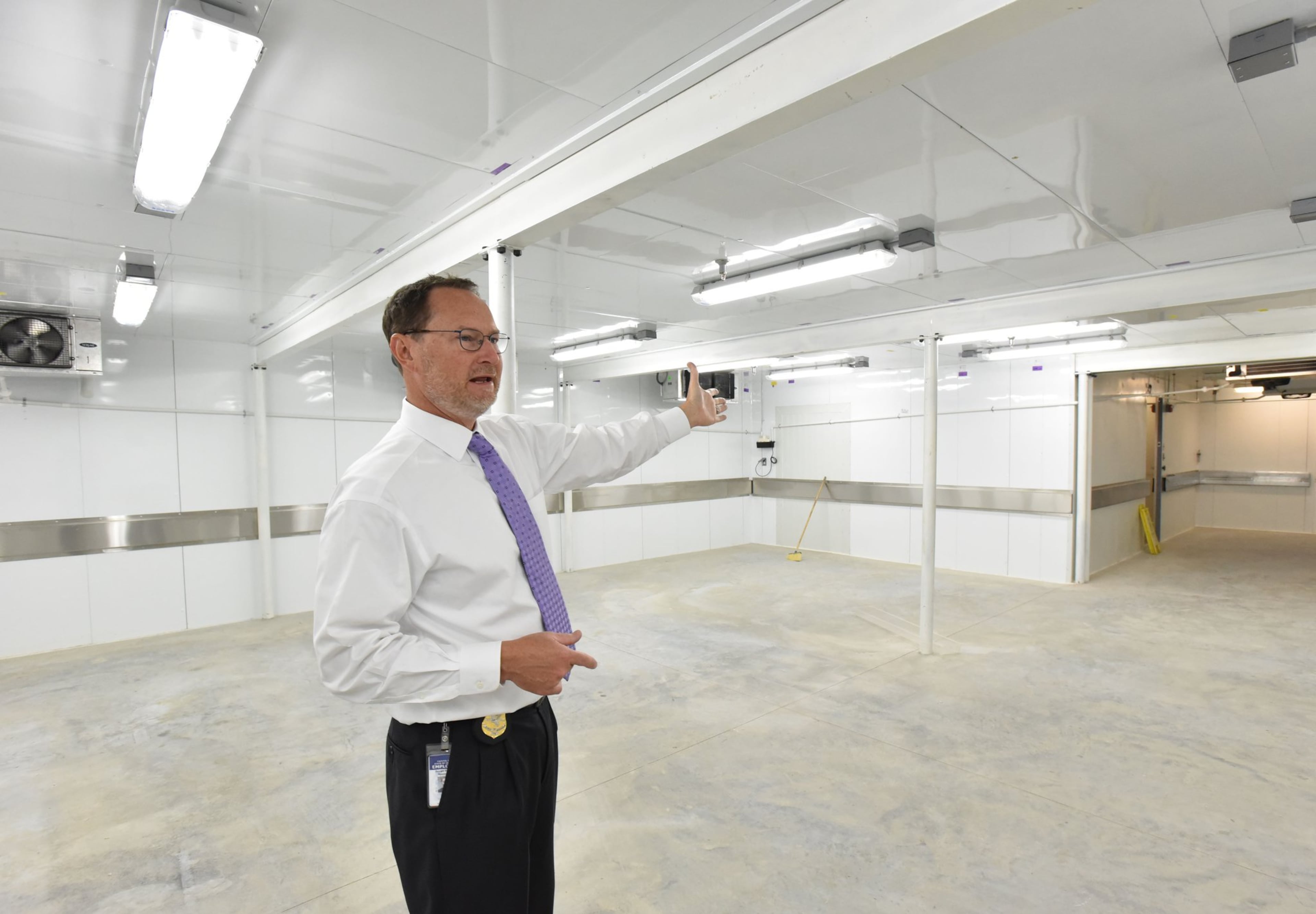At GBI morgue, a scramble to handle more bodies
Dr. Jonathan Eisenstat’s coffee had likely gone cold over a half-hour ago. The chief medical examiner at the Georgia Bureau of Investigation clutched the venti from Starbucks in two hands and watched another doctor X-ray an orange body bag.
It was around minus 4 degrees centigrade, or slightly below 25 degrees Fahrenheit, but the examiners went about their work in short-sleeved uniforms, preparing to perform autopsies on bodies that had come to the morgue from 154 of Georgia’s 159 counties across the state.
The state morgue is kept at a low temperature to keep the bodies inside from decomposing. It’s necessary — the Medical Examiner’s Office might be a temporary home for anywhere from 20 to 30 bodies at a time.

In November, the GBI held a ribbon-cutting ceremony officially opening a sleek new facility for the Medical Examiner's Office. The 17,511 square foot, $6.6 million project nearly doubled the cooler space and created office space for the doctors and death investigation specialists who work there.
But the expansion has done nothing to decrease the doctors’ caseloads.
And the increase in overdose deaths from the opioid epidemic, plus an uptick in suicides, has the doctors in Georgia's state morgue — and other morgues around the country — hustling to handle an increased caseload.
Each of the 11 doctors at the GBI’s Medical Examiner’s Office headquarters in Decatur performs about three or four autopsies a day.
“We were at a point in the past where doctors were (each) doing 300 to 350 autopsies per year,” Eisenstat said.
Things have improved somewhat, thanks to the hiring of an additional doctor about five years ago. Each doctor now averages about 250 to 300 autopsies per year. But that still high, considering the national recommendation for medical examiners is 200 autopsies per doctor per year, and no more than 350 annually.
The surplus of bodies has long been an issue for medical examiners in Georgia. Early in 2017, the swell in cases requiring autopsies resulted in a backlog of bodies. With a larger load and limited cooler space, the medical examiner did not have enough room to fit all of the bodies it needed to examine.
When the facility reached maximum capacity, the medical examiner had to tell coroners to hold off on bringing the bodies to the morgue. It sometimes took days for a table to become available. Now they have the room, but not the doctors.
“It hasn’t affected the number of cases, but we are able to get them here and get them examined quicker than we were in the past,” Eisenstat said.

Forensic pathology is “an underserved profession,” and medical examiners are hard to find, Eisenstat said. But he hopes that in coming years the Medical Examiner’s Office will have more doctors to examine the ever-increasing number of cases coming to the morgue.
The need shows no sign of abating.
In Georgia, the suicide rate increased by 16.2 percent between 1999 and 2016. Last year, Georgia stood among the top 11 states in the country with the most prescription opioid overdose deaths, according to the Georgia Department of Public Health. Data show 55 of the state's 159 counties had higher drug overdose rates than the U.S. average in 2014.
“Every year I ask for more staff,” Eisenstat said, “because it’s not just the doctors we need. We need investigators. We need administrative staff. Because it’s not just the doctor’s caseloads that are increasing.”
WHAT MEDICAL EXAMINERS INVESTIGATE
Death cases are reported to the Medical Examiner’s Office by coroners and law enforcement. Per the Georgia Bureau of Investigation’s website, the ME investigates deaths that:
- are apparently homicidal, suicidal, or occur under suspicious circumstances
- result from the unlawful use of controlled substances or abuse of chemicals or toxic agents
- occur during incarceration or while in custody of a law enforcement officer
- occur accidentally following an injury
- are caused by disease, injury or toxic agent during or arising from employment
- occur while under the care of a physician
- are related to disease that might constitute a threat to the health of the general public
- involve human remains that have been disposed of in an offensive manner

